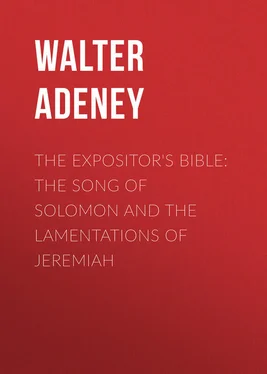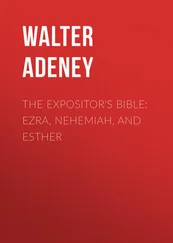Walter Adeney - The Expositor's Bible - The Song of Solomon and the Lamentations of Jeremiah
Здесь есть возможность читать онлайн «Walter Adeney - The Expositor's Bible - The Song of Solomon and the Lamentations of Jeremiah» — ознакомительный отрывок электронной книги совершенно бесплатно, а после прочтения отрывка купить полную версию. В некоторых случаях можно слушать аудио, скачать через торрент в формате fb2 и присутствует краткое содержание. Издательство: Иностранный паблик, Жанр: foreign_religion, foreign_antique, foreign_prose, на английском языке. Описание произведения, (предисловие) а так же отзывы посетителей доступны на портале библиотеки ЛибКат.
- Название:The Expositor's Bible: The Song of Solomon and the Lamentations of Jeremiah
- Автор:
- Издательство:Иностранный паблик
- Жанр:
- Год:неизвестен
- ISBN:нет данных
- Рейтинг книги:3 / 5. Голосов: 1
-
Избранное:Добавить в избранное
- Отзывы:
-
Ваша оценка:
- 60
- 1
- 2
- 3
- 4
- 5
The Expositor's Bible: The Song of Solomon and the Lamentations of Jeremiah: краткое содержание, описание и аннотация
Предлагаем к чтению аннотацию, описание, краткое содержание или предисловие (зависит от того, что написал сам автор книги «The Expositor's Bible: The Song of Solomon and the Lamentations of Jeremiah»). Если вы не нашли необходимую информацию о книге — напишите в комментариях, мы постараемся отыскать её.
The Expositor's Bible: The Song of Solomon and the Lamentations of Jeremiah — читать онлайн ознакомительный отрывок
Ниже представлен текст книги, разбитый по страницам. Система сохранения места последней прочитанной страницы, позволяет с удобством читать онлайн бесплатно книгу «The Expositor's Bible: The Song of Solomon and the Lamentations of Jeremiah», без необходимости каждый раз заново искать на чём Вы остановились. Поставьте закладку, и сможете в любой момент перейти на страницу, на которой закончили чтение.
Интервал:
Закладка:
"Thou art beautiful, O my love, as Tirzah,
Comely as Jerusalem." 7 7 vi. 4.
Now this city was the northern capital for about fifty years after the death of Solomon – from the time of Jeroboam, who made it his royal residence, 8 8 1 Kings xiv. 17.
till the reign of Omri, who abandoned the ill-omened place six years after his vanquished predecessor Zimri had burnt the palace over his own head. 9 9 1 Kings xvi. 18, 23, 24.
The way in which the old capital is mentioned here implies that it is still to the north what Jerusalem is to the south. Thus we are brought to the half century after the death of the king whose name the book bears.
The mention of Tirzah as the equal of Jerusalem is also an evidence of the northern origin of the poem; for it is not at all probable that a subject of the mutilated nation of the south would describe the beauty of the rebel headquarters by the side of that of his own idolised city, as something typical and perfect. But the poem throughout gives indications of its origin in the country parts of the north. Shunem, famous as the scene of Elisha's great miracle, seems to be the home of the heroine. 10 10 vi. 13.
The poet turns to all points of the compass for images with which to enrich his pictures – Sharon on the western coast, 11 11 ii. 1.
Gilead across the Jordan to the east, 12 12 iv. 1.
Engedi by the wilderness of the Dead Sea, 13 13 i. 14.
as well as the northern districts. But the north is most frequently mentioned. Lebanon is named over and over again, 14 14 iii. 9; iv. 8, 15; vii. 4.
and Hermon is referred to as in the neighbourhood of the shepherd's home. 15 15 iv. 8.
In fact the poem is saturated with the fragrant atmosphere of the northern mountains.
Now this has suggested a striking inference. Here we have a picture of Solomon and his court from the not too friendly hand of a citizen of the revolted provinces. The history in the Books of Kings is written from the standpoint of Judah; it is curious to learn how the people of the north thought of Solomon in all his glory. Thus considered the book acquires a secondary and political meaning. It appears as a scornful condemnation of the court at Jerusalem on the part of the poorer and more simple inhabitants of the kingdom of Jeroboam and his successors. 16 16 See Ency. Brit. , Art. "Canticles," by Robertson Smith.
But it also stands for all time as a protest against luxury and vice, and as a testimony to the beauty and dignity of pure love, stanch fidelity, and quiet, wholesome, primitive country manners. It breathes the spirit that reappears in Goldsmith's Deserted Village , and inspires the muse of Wordsworth, as in the poem which contrasts the dove's simple notes with the nightingale's tumultuous song, saying of the homely bird,
"He sang of love with quiet blending;
Slow to begin, and never ending;
Of serious faith and inward glee;
That was the song – the song for me."
CHAPTER II
TRUE LOVE TESTED
The poem opens with a scene in Solomon's palace. A country maiden has just been introduced to the royal harem. The situation is painful enough in itself, for the poor, shy girl is experiencing the miserable loneliness of finding herself in an unsympathetic crowd. But that is not all. She is at once the object of general observation; every eye is turned towards her; and curiosity is only succeeded by ill-concealed disgust. Still the slavish women, presumably acting on command, set themselves to excite the new comer's admiration for their lord and master. First one speaks some bold amorous words, 17 17 i. 2.
and then the whole chorus follows. 18 18 i. 3.
All this is distressing and alarming to the captive, who calls on her absent lover to fetch her away from such an uncongenial scene; she longs to run after him; for it is the king who has brought her into his chambers, not her own will. 19 19 i. 4.
The women of the harem take no notice of this interruption, but finish their ode on the charms of Solomon. All the while they are staring at the rustic maiden, and she now becomes conscious of a growing contempt in their looks. What is she that the attractions of the king before which the dainty ladies of the court prostrate themselves should have no fascination for her? She notices the contrast between the swarthy hue of her sun-burnt countenance and the pale complexion of these pampered products of palace seclusion. She is so dark in comparison with them that she likens herself to the black goats-hair tents of the Arabs. 20 20 i. 5.
The explanation is that her brothers have made her work in their vineyards. Meanwhile she has not kept her own vineyard. 21 21 i. 6.
She has not guarded her beauty as these idle women, who have nothing else to do, have guarded theirs; but perhaps she has a sadder thought – she could not protect herself when out alone at her task in the country or she would never have been captured and carried on to the prison where she now sits disconsolate. Possibly the vineyard she has not kept is the lover whom she has lost. 22 22 See viii. 12.
Still she is a woman, and with a touch of piqued pride she reminds her critics that if she is dark – black compared with them – she is comely. They cannot deny that. It is the cause of all her misery; she owes her imprisonment to her beauty. She knows that their secret feeling is one of envy of her, the latest favourite. Then their affected contempt is groundless. But, indeed, she has no desire to stand as their rival. She would gladly make her escape. She speaks in a half soliloquy. Will not somebody tell her where he is whom her soul loveth? Where is her lost shepherd lad? Where is he feeding his flock? Where is he resting it at noon? Such questions only provoke mockery. Addressing the simple girl as the "fairest among women," the court ladies bid her find her lover for herself. Let her go back to her country life and feed her kids by the shepherds' tents. Doubtless if she is bold enough to court her swain in that way she will not miss seeing him.
Hitherto Solomon has not appeared. Now he comes on the scene, and proceeds to accost his new acquisition in highly complimentary language, with the ease of an expert in the art of courtship. At this point we encounter the most serious difficulty for the theory of a shepherd lover. To all appearances a dialogue between the king and the Shulammite here ensues. 23 23 i. 9 – ii. 6.
But if this were the case, the country girl would be addressing Solomon in terms of the utmost endearment – conduct utterly incompatible with the "shepherd hypothesis." The only alternative is to suppose that the hard-pressed girl takes refuge from the importunity of her royal flatterer by turning aside to an imaginary, half dream-like conversation with her absent lover. This is not by any means a probable position, it must be allowed; it seems to put a strained interpretation on the text. Undoubtedly if the passage before us stood by itself, there would not be any difference of opinion about it; everybody would take it in its obvious meaning as a conversation between two lovers. But it does not stand by itself – unless, indeed, we are to give up the unity of the book. Therefore it must be interpreted so as not to contradict the whole course of the poem, which shews that another than Solomon is the true lover of the disconsolate maiden.
The king begins with the familiar device by which rich men all the world over try to win the confidence of poor girls when there is no love on either side, – a device which has been only too successful in the case of many a weak Marguerite though her tempter has not always been a handsome Faust; but in the present case innocence is fortified by true love, and the trick is a failure. The king notices that this peasant girl has but simple plaited hair and homely ornaments. She shall have plaits of gold and studs of silver! Splendid as one of Pharaoh's chariot horses, she shall be decorated as magnificently as they are decorated! What is this to our stanch heroine? She treats it with absolute indifference, and begins to soliloquise, with a touch of scorn in her language. She has been loaded with scent after the manner of the luxurious court, and the king while seated feasting at his table has caught the odour of the rich perfumes. That is why he is now by her side. Does he think that she will serve as a new dainty for the great banquet, as a fresh fillip for the jaded appetite of the royal voluptuary? If so he is much mistaken. The king's promises have no attraction for her, and she turns for relief to dear memories of her true love. The thought of him is fragrant as the bundle of myrrh she carries in her bosom, as the henna-flowers that bloom in the vineyards of far-off Engedi.
Читать дальшеИнтервал:
Закладка:
Похожие книги на «The Expositor's Bible: The Song of Solomon and the Lamentations of Jeremiah»
Представляем Вашему вниманию похожие книги на «The Expositor's Bible: The Song of Solomon and the Lamentations of Jeremiah» списком для выбора. Мы отобрали схожую по названию и смыслу литературу в надежде предоставить читателям больше вариантов отыскать новые, интересные, ещё непрочитанные произведения.
Обсуждение, отзывы о книге «The Expositor's Bible: The Song of Solomon and the Lamentations of Jeremiah» и просто собственные мнения читателей. Оставьте ваши комментарии, напишите, что Вы думаете о произведении, его смысле или главных героях. Укажите что конкретно понравилось, а что нет, и почему Вы так считаете.












